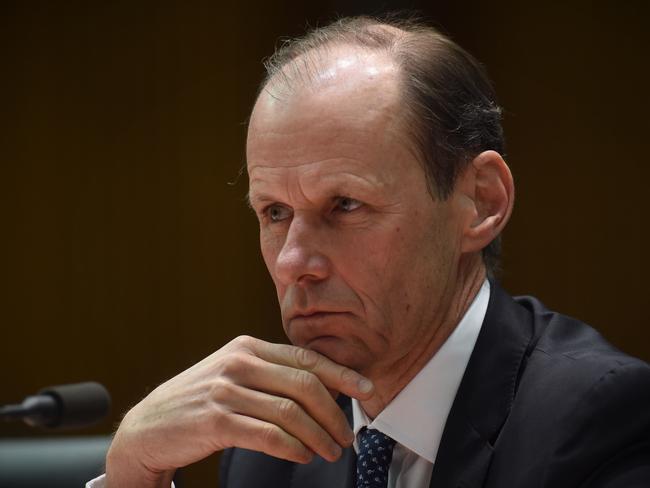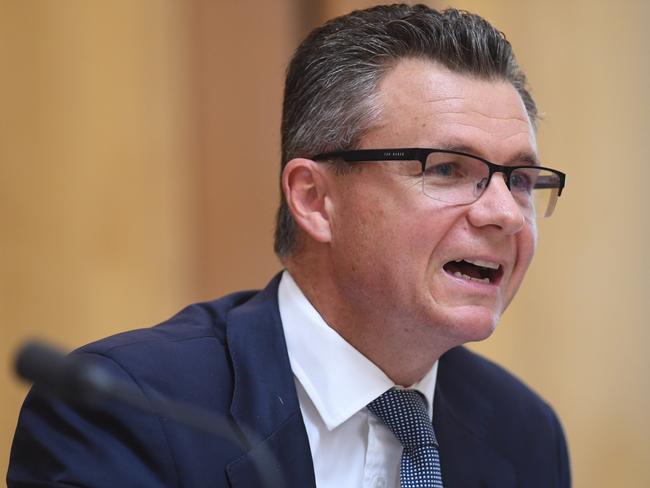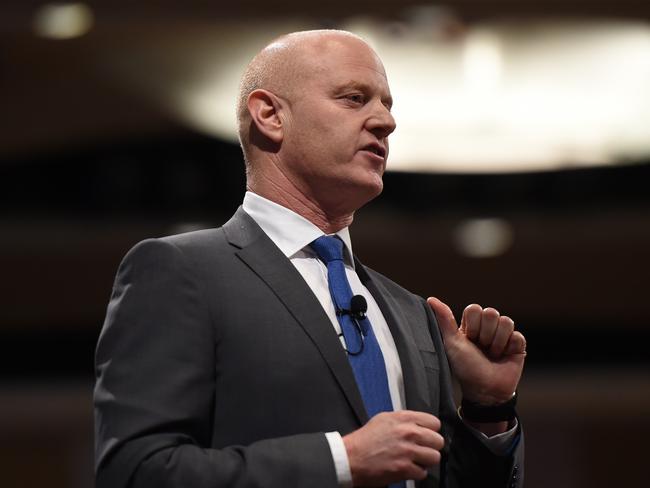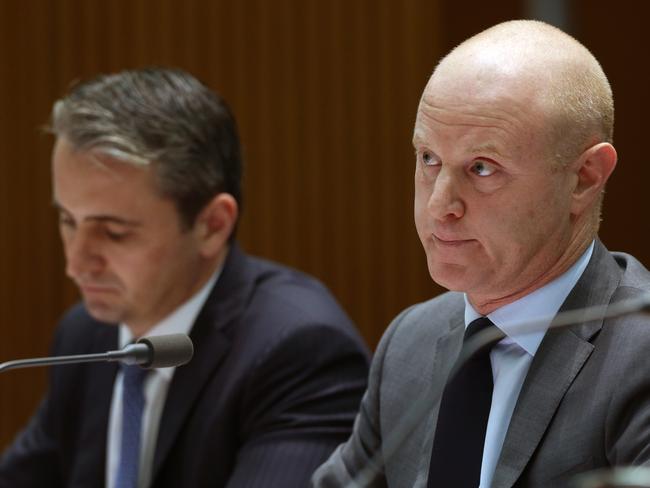Commonwealth Bank boss Ian Narev, ANZ boss Shayne Elliot front parliamentary inquiry
THE ANZ Bank’s CEO has told of how he wants to change the bank, but not at the expense of creating a ‘culture of fear’, after CommBank’s boss was grilled.
Banking
Don't miss out on the headlines from Banking. Followed categories will be added to My News.
ANZ CEO Shayne Elliott has warned overly punitive sanctions on executives responsible for misconduct can lead to a “culture of fear”.
Speaking after Commonwealth Bank boss Ian Narev at a House of Representatives Economics standing committee review into Australia’s four major banks on Tuesday, Mr Elliott said the committee’s proposal to increase the level of public disclosure of executives responsible when misconduct occurs could be “largely implemented”, but required some consideration.
“In more than 20 years of managerial roles, it is my experience that overly punitive sanctions, like the risk of public shaming, can lead to a culture of fear,” he told the committee.
“A culture of fear saps the courage of even good people to own up to their mistakes and call out when they see the mistakes of others.”
Like Mr Narev, he was asked about the necessity of a royal commission into the banking sector, especially given the fact there are at present 20 inquiries into banking.
“We think it’s more effective to have narrowly focused targeted reviews that get things done rather than have a broad review that’s a multiyear process,” Mr Narev said.
Mr Elliott said he didn’t believe a Royal Commission would lead to a return of public trust in the banking industry.
“I’m not convinced about that,” he said.
He also asserted that current recommendations were “doing good work”.
“If the outcome is to make real change in the industry for the benefit of customers, we think the current approach is better: targeted, shorter reviews which are actually focused on customer outcomes,”
RELATED: CBA boss’ clever argument

Mr Elliott also said a Royal Commission could affect foreign investment.
“I think any time there is a review, foreign investors will look cautiously to understand what the signals are in terms of risk profile,” he said.
“There would be more for them to consider. I don’t know that it would be a good thing.
Labor MP Matt Thistlethwaite quizzed the banking chief over former ANZ financial planner, Andrew Tamby Rajah, who was banned from providing financial services for five years after it was discovered he forged customer’s signatures.
The question was directed to ANZ managing director, Alexis George, who said the bank was extensively reviewing its financial planner network. She said employees were under far more stringent requirements than before the banking hearing.
“We want to rebuild the trust. That’s an important service we provide,” she said.
Mr Elliott said ANZ had “no interest in having bad people move from us to a competitor”.
When asked about the fairness of market share, ANZ only had 15 per cent and didn’t feel as though the company operated with a “big bank” mentality.
“The rate of churn and the rate of customer choice here is actually really high,” he said.
Mr Elliott said he only had the benefit of his experience and admitted some regulators might disagree with the statement.
Unlike Mr Narev, the ANZ chief said he was happy for the ACCC to provide six-monthly recommendations to the Treasurer about competition.
The CBA boss earlier said he believed the Productivity Commission should be the chosen body to assess competition.
“We have no issue with that whatsoever,” Mr Elliott said.
CBA BOSS GRILLED: ‘IT BEGGARS BELIEF’
Commonwealth Bank boss Ian Narev has clashed with Labor MP Matt Thistlethwaite during a fiery exchange at a banking hearing in Canberra.
Mr Narev argued a royal commission would send the wrong message to policy makers and be “very damaging” for the banking industry.
“I think the message that the convening of a royal commission would send over policy makers, bank and management over the last decade would not be positive for the industry, not be positive for the perception of our industry, that is strong,” he said.
Mr Thistlethwaite struck back, claiming the bank had done a “pretty good job” of damaging their image on their own terms.
“Pardon my cynicism, you guys have done a pretty good job in destroying confidence in the banking industry over the last decade, haven’t you?” he said.

COMMBANK BOSS MAKES SHOCKING ADMISSION
It came after Mr Narev admitted no customers or victims were interviewed as part of a report commissioned to investigate claims of unethical behaviour at the bank’s insurance arm.
Mr Narev said the report had been described as “robust” and “independent”.
He defended the integrity of the investigation, saying Deloitte had unfettered access to hundreds of thousands of customer emails and that there had been no need to interview customers personally.
Mr Thistlethwaite said it “beggared belief” that no customers had been interviewed and was “obnoxious” on the bank’s behalf.
“Here you’ve got a report, based on victims that have been denied claims, but you don’t interview any victims, you don’t interview any customers ... that’s true, isn’t it?” He asked.
“Yes,” Mr Narev told the inquiry.

REMUNERATION REPORT “OPAQUE, NOT TRANSPARENT”
The CBA boss also came under fire from Labor MP Matt Keogh, who said there was a lack of transparency in how the bank’s remuneration reports were structured.
He also asked whether any BankWest branches would be closed in Western Australia, to which Mr Narev replied: “I’m not going to rule out any decisions today”.
Liberal MP Julia Banks reflected on a recent ABC’s Four Corners episode, which detailed the experiences of CommInsure customers who claimed they had been wronged.
“I ask that you give strong consideration to a really, really robust (risk management) framework,” she said.
“You have to get your skates on ... it is imperative we get this done now.”
Questioning the need for a royal commission into the banking sector, Labor MP Madeleine King asked Mr Narev what was more important: the public trust of Australian customers, or overseas investors?
“The bank cannot exist without both of them,” he responded.
CBA BOSS ADMITS NOTHING HAS CHANGED
Mr Narev conceded the bank had not done enough to build the trust of its customers but insisted it was trying to do more.
“We have not done enough to do and build that trust. We have made mistakes,” he told the parliamentary hearing.
MORE: ANZ CEO quizzed over “blokey culture”
MORE: Minute by minute, what happened on day one of the inquiry
MORE: CBA boss defends interest rate for small business loans
“For our part, we were put on notice, the community expected to see change. We have listened, we are listening and we are acting. Our work is ongoing.” Mr Narev and
ANZ CEO Shayne Elliott will be called after Mr Narev, where he is expected to give evidence for three hours.
It’s the second time in five months the pair has been called before an inquiry set up by the government following the community uproar over the big four banks’ failure to pass on a central bank interest rate cut last August.

ANZ broke ranks a few weeks ago when it cut the interest rate on two of its credit cards — one of them by two per cent.
Prime Minister Malcolm Turnbull said the move was the result of the inquiry’s first round of grillings last October.
National Australia Bank chief executive Andrew Thorburn was the first of the big four bosses to front the committee on Friday.
He was questioned by both sides of politics about the consequences for executives and financial planners for mismanaging client funds.
Originally published as Commonwealth Bank boss Ian Narev, ANZ boss Shayne Elliot front parliamentary inquiry


